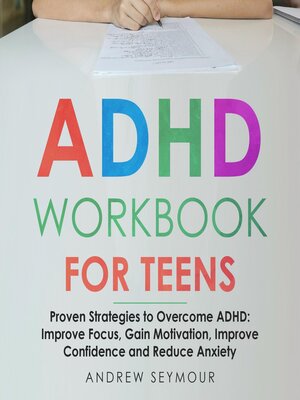ADHD Workbook For Teens
audiobook (Unabridged) ∣ ADHD Workbook For Children and Teens with Proven Strategies to Overcome ADHD: Improve Focus, Gain Motivation, Improve Confidence and Reduce Anxiety
By Andrew Seymour

Sign up to save your library
With an OverDrive account, you can save your favorite libraries for at-a-glance information about availability. Find out more about OverDrive accounts.
Find this title in Libby, the library reading app by OverDrive.



Search for a digital library with this title
Title found at these libraries:
| Library Name | Distance |
|---|---|
| Loading... |
While most teens deal with learning, social difficulties, and domestic challenges, ADHD can make these challenges more difficult to handle or worsen. It's therefore crucial to support children and teens with ADHD develop the skillsets that will help them achieve their life goals and aspiration.
Suppose your teen has been diagnosed with ADHD, and it affects their academic performance. In that case, they might be eligible for classroom concessions, including additional exam time, extra teaching sessions, or any other support that will help them realise their goals. You should contact the school or your local authority if you think your child or teen may be qualified for such concessions.
Children and Teens with ADHD often struggle to engage with their peers because of their impulsivity, hyperactivity, and agitation.
Adolescents with ADHD tend to be more intrusive in social environments and louder and distractible than their peers. Peer pressure and rejection that begin in childhood will continue well into adolescence. Additionally, a lack of supportive peer interactions in earlier years can reduce opportunities to learn and develop social skills, exacerbating existing deficits.
Finally, peer interactions become more significant during puberty. As a consequence, difficulties forming and maintaining relationships can impede one's ability to function. Teens with ADHD are more likely to associate with the "wrong crowd" or face rejection from their peers.
Organising social activities for your youth, such as sports, festivals, or neighbourhood groups, can help build fun opportunities to balance out other, less friendly relationships.
Suppose your teen has been diagnosed with ADHD, and it affects their academic performance. In that case, they might be eligible for classroom concessions, including additional exam time, extra teaching sessions, or any other support that will help them realise their goals. You should contact the school or your local authority if you think your child or teen may be qualified for such concessions.
Children and Teens with ADHD often struggle to engage with their peers because of their impulsivity, hyperactivity, and agitation.
Adolescents with ADHD tend to be more intrusive in social environments and louder and distractible than their peers. Peer pressure and rejection that begin in childhood will continue well into adolescence. Additionally, a lack of supportive peer interactions in earlier years can reduce opportunities to learn and develop social skills, exacerbating existing deficits.
Finally, peer interactions become more significant during puberty. As a consequence, difficulties forming and maintaining relationships can impede one's ability to function. Teens with ADHD are more likely to associate with the "wrong crowd" or face rejection from their peers.
Organising social activities for your youth, such as sports, festivals, or neighbourhood groups, can help build fun opportunities to balance out other, less friendly relationships.







